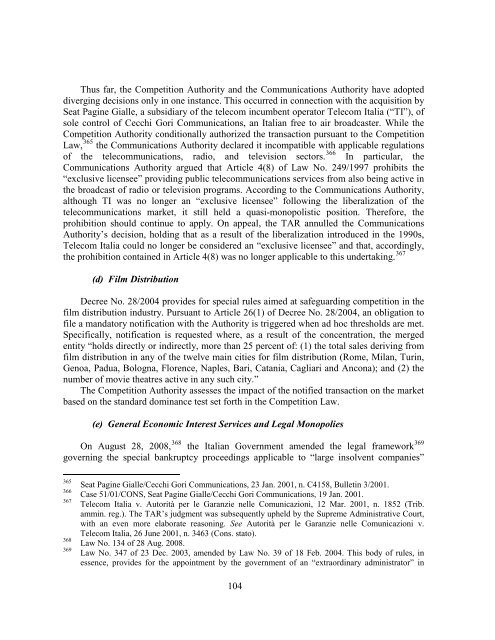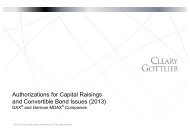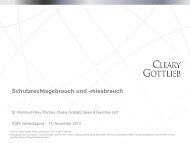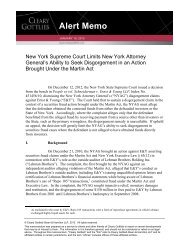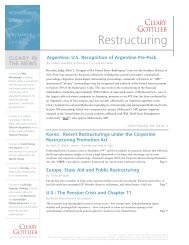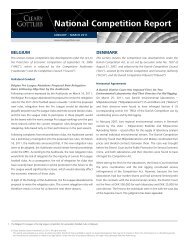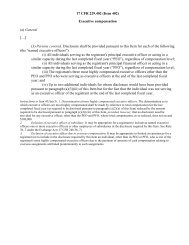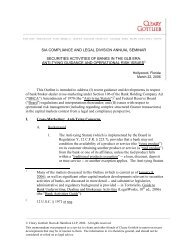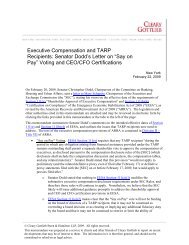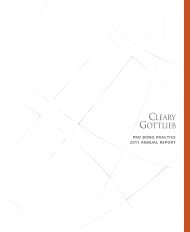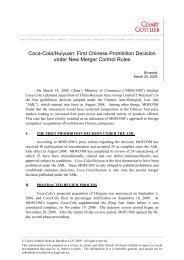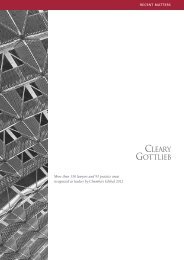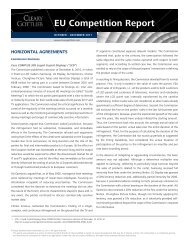Competition Law in Italy The first 20 years of law and practice
Competition Law in Italy The first 20 years of law and practice
Competition Law in Italy The first 20 years of law and practice
Create successful ePaper yourself
Turn your PDF publications into a flip-book with our unique Google optimized e-Paper software.
Thus far, the <strong>Competition</strong> Authority <strong>and</strong> the Communications Authority have adopted<br />
diverg<strong>in</strong>g decisions only <strong>in</strong> one <strong>in</strong>stance. This occurred <strong>in</strong> connection with the acquisition by<br />
Seat Pag<strong>in</strong>e Gialle, a subsidiary <strong>of</strong> the telecom <strong>in</strong>cumbent operator Telecom Italia (“TI”), <strong>of</strong><br />
sole control <strong>of</strong> Cecchi Gori Communications, an Italian free to air broadcaster. While the<br />
<strong>Competition</strong> Authority conditionally authorized the transaction pursuant to the <strong>Competition</strong><br />
<strong>Law</strong>, 365 the Communications Authority declared it <strong>in</strong>compatible with applicable regulations<br />
<strong>of</strong> the telecommunications, radio, <strong>and</strong> television sectors. 366 In particular, the<br />
Communications Authority argued that Article 4(8) <strong>of</strong> <strong>Law</strong> No. 249/1997 prohibits the<br />
“exclusive licensee” provid<strong>in</strong>g public telecommunications services from also be<strong>in</strong>g active <strong>in</strong><br />
the broadcast <strong>of</strong> radio or television programs. Accord<strong>in</strong>g to the Communications Authority,<br />
although TI was no longer an “exclusive licensee” follow<strong>in</strong>g the liberalization <strong>of</strong> the<br />
telecommunications market, it still held a quasi-monopolistic position. <strong>The</strong>refore, the<br />
prohibition should cont<strong>in</strong>ue to apply. On appeal, the TAR annulled the Communications<br />
Authority’s decision, hold<strong>in</strong>g that as a result <strong>of</strong> the liberalization <strong>in</strong>troduced <strong>in</strong> the 1990s,<br />
Telecom Italia could no longer be considered an “exclusive licensee” <strong>and</strong> that, accord<strong>in</strong>gly,<br />
the prohibition conta<strong>in</strong>ed <strong>in</strong> Article 4(8) was no longer applicable to this undertak<strong>in</strong>g. 367<br />
(d) Film Distribution<br />
Decree No. 28/<strong>20</strong>04 provides for special rules aimed at safeguard<strong>in</strong>g competition <strong>in</strong> the<br />
film distribution <strong>in</strong>dustry. Pursuant to Article 26(1) <strong>of</strong> Decree No. 28/<strong>20</strong>04, an obligation to<br />
file a m<strong>and</strong>atory notification with the Authority is triggered when ad hoc thresholds are met.<br />
Specifically, notification is requested where, as a result <strong>of</strong> the concentration, the merged<br />
entity “holds directly or <strong>in</strong>directly, more than 25 percent <strong>of</strong>: (1) the total sales deriv<strong>in</strong>g from<br />
film distribution <strong>in</strong> any <strong>of</strong> the twelve ma<strong>in</strong> cities for film distribution (Rome, Milan, Tur<strong>in</strong>,<br />
Genoa, Padua, Bologna, Florence, Naples, Bari, Catania, Cagliari <strong>and</strong> Ancona); <strong>and</strong> (2) the<br />
number <strong>of</strong> movie theatres active <strong>in</strong> any such city.”<br />
<strong>The</strong> <strong>Competition</strong> Authority assesses the impact <strong>of</strong> the notified transaction on the market<br />
based on the st<strong>and</strong>ard dom<strong>in</strong>ance test set forth <strong>in</strong> the <strong>Competition</strong> <strong>Law</strong>.<br />
(e) General Economic Interest Services <strong>and</strong> Legal Monopolies<br />
On August 28, <strong>20</strong>08, 368 the Italian Government amended the legal framework 369<br />
govern<strong>in</strong>g the special bankruptcy proceed<strong>in</strong>gs applicable to “large <strong>in</strong>solvent companies”<br />
365<br />
Seat Pag<strong>in</strong>e Gialle/Cecchi Gori Communications, 23 Jan. <strong>20</strong>01, n. C4158, Bullet<strong>in</strong> 3/<strong>20</strong>01.<br />
366<br />
Case 51/01/CONS, Seat Pag<strong>in</strong>e Gialle/Cecchi Gori Communications, 19 Jan. <strong>20</strong>01.<br />
367<br />
Telecom Italia v. Autorità per le Garanzie nelle Comunicazioni, 12 Mar. <strong>20</strong>01, n. 1852 (Trib.<br />
amm<strong>in</strong>. reg.). <strong>The</strong> TAR’s judgment was subsequently upheld by the Supreme Adm<strong>in</strong>istrative Court,<br />
with an even more elaborate reason<strong>in</strong>g. See Autorità per le Garanzie nelle Comunicazioni v.<br />
Telecom Italia, 26 June <strong>20</strong>01, n. 3463 (Cons. stato).<br />
368<br />
<strong>Law</strong> No. 134 <strong>of</strong> 28 Aug. <strong>20</strong>08.<br />
369<br />
<strong>Law</strong> No. 347 <strong>of</strong> 23 Dec. <strong>20</strong>03, amended by <strong>Law</strong> No. 39 <strong>of</strong> 18 Feb. <strong>20</strong>04. This body <strong>of</strong> rules, <strong>in</strong><br />
essence, provides for the appo<strong>in</strong>tment by the government <strong>of</strong> an “extraord<strong>in</strong>ary adm<strong>in</strong>istrator” <strong>in</strong><br />
104


